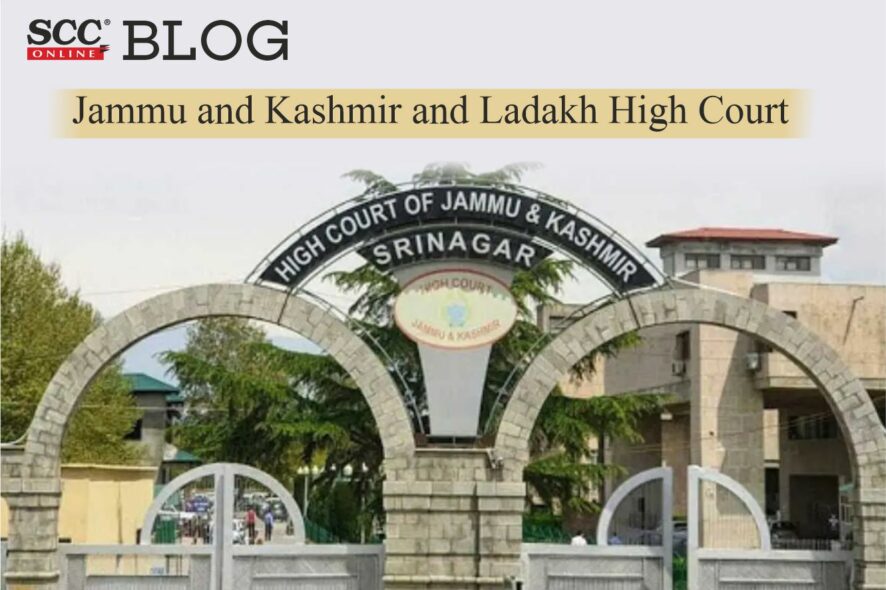Jammu and Kashmir and Ladakh High Court: While deciding the instant appeal wherein substantial questions of law were raised vis-a-vis SectionS 80, CPC; the Single Judge Bench of Vinod Chatterji Koul, J., held that the language of Section 80 is very clear in stating that at the time of filing a suit, if the plaintiff can establish that there is an urgency to seek relief, then the Court on its satisfaction, may dispense off with the requirement of notice before filing a suit under Section 80.
Facts and Legal Trajectory of the case: The Chief Medical Officer, Pulwama, issued advertisement on 06-02-2012 inviting applications from eligible candidates of District Pulwama, for the posts of Female Multipurpose Health Worker (hereinafter FMPHW) for Sub Centre Amlar. The advertisement was issued under the National Rural Health Mission (NRHM). The prescribed qualification was Diploma in FMPHW and that the candidate should be resident of the locality where the Health Institution is located so as to ensure continuous presence for 24 x 7 days’ service.
In pursuance of the afore-stated advertisement, the appellant and the respondent applied for the post. The appellant was appointed on 19-05-2012 as FMPHW at Sub-Centre Amlar, Block Tral, and joined her duties on 21.05.2012. The respondent, however filed a suit seeking to declare the appellant’s appointment null and void as the officials acted in derogation to the rules and guidelines as stated in the advertisement and were under a mistaken assumption in considering Nowpora as a village. The Trial Court held that the appointment of the appellant was illegal.
Aggrieved by the decision, the appellant approached the Principal District Judge, Pulwama, who dismissed the appeal. The appellant then approached the High Court claiming that there are substantial questions of law that require the High Court’s consideration.
The Substantial Questions of Law in this case: The Court while considering the instant appeal, framed the following questions of law-
- Whether a suit instituted against the Government and its functionaries, in which emergency is invoked, can be maintained and continued, when no interim relief is granted in the case?
- Whether in terms of Section 80 (3), CPC was it mandatory for the Trial Court to return the plaint to the plaintiff, as no interim relief was granted in the case with regard to the appointment of the appellant?
-
Whether in judging the appointment of the appellant as FMPHW, did the Trial Court introduce a criterion which is foreign to the advertisement notice as also the norms fixed by the Government?
Observations and Decision: While deliberating upon questions framed, the Court observed that Questions I and II are interconnected as they require consideration of S. 80, CPC.
- It is provided under S. 80 of CPC that if the Court feels that there is no relief to be urgently granted, then it shall refuse to grant such leave and return the plaint. Refusal to grant relief is to be considered at the stage when a suit is sought to be filed without issuance of notice as required under S. 80, CPC. The plaint would be returned if at that stage, the Court finds that there is no urgency in the suit or in passing an urgent relief.
- From the plain reading of S. 80 (3), CPC along with proviso attached to sub-section (3), it is clear that plaint can be returned if leave is refused. The consideration of application for a grant of temporary injunction would arise after leave is granted and notice in such application is given to the State or Government functionaries.
- Vis-a-vis Question III, the Court observed that the local criteria for the appointment of FMPHW as per the advertisement, were at the village level. Furthermore, upon perusing the evidence recorded by the Trial Court, the Bench observed that no new criterion was introduced that was foreign to the advertisement. The High Court also pointed out that both the appellant and respondent were from the same village and fulfilled the criteria as contained in advertisement notice.
-
With the above-stated observations, the Court dismissed the appeal but allowed the appellant to make representations before official respondents if it is permissible.
[Raisa Banoo v. Shameema, 2022 SCC OnLine J&K 586, decided on 21-07-2022]
Advocates who appeared in this case :
G. A. Lone, & Mujeeb Andrabi, Advocates, for the Appellant;
Rayees Ahmad Ganaie, GA and Showkat Ali Khan, Advocates, for the Respondents.
*Sucheta Sarkar, Editorial Assistant has prepared this brief.







